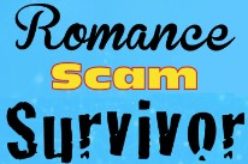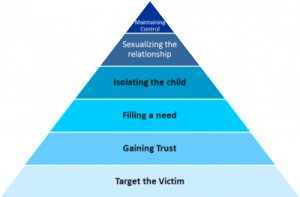Even after realising we have been scammed the one question that remains, not only for our friends and families, but also for ourselves is “How did this happen?”, “How could I, an intelligent, successful, down to earth, usually rational and responsible person, have done this?” I took several months to write out all that happened into a diary/timeline after realising I had been scammed. Even after doing this I still did not fully understand. That came later…
The reality is that we are ‘groomed’, similar to how child abuse victims are groomed.
These tactics of grooming by child abusers include[1] :
- the ability to charm, to be likeable, to radiate sincerity and truthfulness
- establishing a trusting relationship, for example spending time with them and listening to them. They may treat the child as ‘special’; giving them presents and compliments.
- use gifts and trickery to manipulate and silence the child into keeping the sexual assault a secret. This treatment can isolate the child from siblings, friends or parents.
- gradually desensitising the child and violating their boundaries. For example, they may spend a lot of time with the child when he or she is bathing, dressing, or going to bed.
- convincing them that if they tell about the sexual abuse, something terrible will happen
- giving the child the impression that they have consented and that they are in a ‘relationship’ with the offender, or even that they initiated the relationship
- making the child to feel responsible for the abuse, and feel too ashamed or scared to tell anyone.
As I compiled this list for this blog I understood even more about the deliberation used in romance scams. By changing the word child to person, and other minor changes to the sentence, all of the above happen in a romance scam (at least my scam), often including sexual abuse (through cybersex). There is one more tactic though that is more relevant in scams of adults, an understanding of which adds to the picture.
In my list of being groomed for a romance scam the scammer:
- builds a very strong and intimate relationship, so that it feels in your mind like they are part of the family. This may include initiating a proposal of marriage, and positioning for and ‘committing to’ a long term partnership or marriage. I have highlighted ‘committing to’, as there is never any intention of following through on this in a scam.
Points 1, and 6 from the child grooming list above are relevant here. As well, there is evidence that as we become more ‘in love’ the love hormone oxytocin will create more trust and develop more empathy. We are very familiar with the ‘honeymoon period’ of a relationship and I suspect this is partly what is in operation during this period. We know from outside that when someone is in the honeymoon period we are in an altered state, we are seeing things ‘through rose coloured glasses’ and that it will, over time, pass and things will become normal again.
Donna Andersen[2], in her blog on Lovefraud.com, from her understanding of the work done by Paul Zac comments:
When psychopaths target us for romantic relationships, they shower us with attention and affection. They spend a lot of time talking with us, and conversation builds trust. They say and do things to indicate that they trust us, and we should trust them. They tell stories about themselves designed to appeal to our empathy. They rush us into emotional, physical and sexual intimacy.
All of this causes the release of oxytocin in our brains, which is absolutely normal. Because of the oxytocin, we feel calm, trusting, empathetic and content. We especially feel trusting of the person who caused this reaction in us — the psychopath.
Though Donna Anderson is considering psychopaths in a much wider context of romance related fraud than I am with romance scammers, I think the term is applicable. Scammers are unfeeling, and unconcerned with consequences, and when I replace psychopath with scammer, these statements are absolutely true.
- Secondly, in romance scams, we are cut off from others. Initially we are cut off from the safety of the dating site, by encouraging us to talk via email, and then talking via a chat or video messaging system such as Yahoo Messenger or Skype. They will never let you see them in person however, because who they are is not the handsome person in the picture they have presented themselves to be in the dating profile.

We are encouraged to cut off from friends and family who might warn us.
If there is any sense of others warning us that this might be a scam, we are encourage to not listen to what others are saying, because “what we have is special, and no-one will ever understand” combined with ”I don’t want your emotions to be upset” and “when they eventually see us together it will be easier to explain”. And because we are now trusting, and feeling we have a special intimacy, we cut off from our friends.
- Thirdly, point 5 above for child grooming translates in a romance scam to “If you don’t give me money something terrible will happen”. This might be innocuous initially, for example, I need something for my business supplies, but as the story is developed, there is ‘evidence’ of awful things happening such as threats of violence to the scammer; stories of being mugged/robbed; car accidents where people are killed; threats of prison and/or not being able to leave the country. These circumstances or reasons for needing money are given in a context of increasing levels of danger and urgency to allow the scammer to get to where their money is accessible and they can repay you the ‘loans’ that you have provided to get them out of trouble. If you don’t pay, terrible things will happen. Which because you are trusting, you believe.
- Fourthly, and this one may be adult specific, scammers keep you sleep deprived

and continually engaged so as to minimise the time you have to reflect and think rationally about what is happening. They talk to you late at night, early in the morning, and through the middle of the night. Often requests for money happen in the middle of the night 1 am – 4 am when it is hard to resist them.
A friend used the term ‘spellbound’ when I was talking to her about my experience, and this term is very appropriate. We have been spellbound through professional and deliberate manipulation of our emotions by professional fraudsters, grooming us to part with our money. It was not personal for them, but the impact is very personal for us.
[1] Laurel House: North and North-West Tasmania Sexual Assault Support Services http://laurelhouse.org.au/?page_id=36 Sexual Offender Tactics and Grooming
[2] Donna Anderson, LoveFraud.com Blog from May 2013 Oxytocin, trust and why we fall for psychopaths










